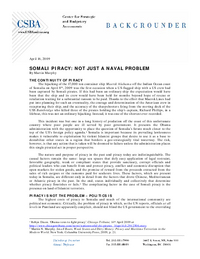
THE CONTINUITY OF PIRACY
The hijacking of the 17,000 ton container ship Maersk Alabama off the Indian Ocean coast of Somalia on April 8th, 2009 was the first occasion when a US-flagged ship with a US crew had been captured by Somali pirates. If this had been an ordinary ship the expectation would have been that the ship and its crew would have been held for months beyond hope of rescue or retaliation waiting for a substantial ransom to be paid. Thanks to the effort that Maersk Lines had put into planning for such an eventuality, the courage and determination of the American crew in recapturing their ship, and the accuracy of the sharpshooters firing from the moving deck of the USS Bainbridge who killed three of the pirates holding the ship’s captain, Richard Phillips, in a lifeboat, this was not an ordinary hijacking. Instead, it was one of the shortest ever recorded.
This incident was but one in a long history of predation off the coast of this unfortunate country where poor people are ill served by poor government. It presents the Obama Administration with the opportunity to place the question of Somalia’s future much closer to the top of the US’s foreign policy agenda. Somalia is important because its prevailing lawlessness makes it vulnerable to exploitation by violent Islamist groups that desire to use it as a base to destabilize other states in a region that borders a geo-strategically vital waterway. The risk, however, is that any action that is taken will be doomed to failure unless the administration places this single piratical act in proper perspective.
The nature and purpose of piracy in the past and piracy today are indistinguishable. The casual factors remain the same: large sea spaces that defy easy application of legal restraint, favorable geography, weak or compliant states that provide sanctuary, corrupt officials and political leaders who can benefit from and protect piracy, conflict and economic disruption that open markets for stolen goods, and the promise of reward from the proceeds extracted from the sales of rich cargoes or the ransoms paid for seafarers lives. These factors, which are present today in Somalia, are different only in detail from the factors that drove Chinese, Mediterranean or Atlantic piracy in the past. In the end, states individually and collectively that determine whether piracy flourishes or fails. The complicating factor in the case of Somali piracy is the presence on land of Islamist terrorists.



























